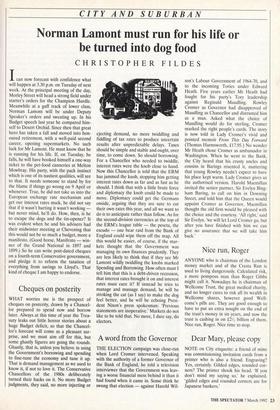Cheques on posterity
WHAT worries me is the prospect of cheques on posterity, drawn by a Chancel- lor prepared to spend now and borrow later. Always at this time of year the Trea- sury leaks out little horror stories about a huge Budget deficit, so that the Chancel- lor's forecast will come as a pleasant sur- prise, and we must aim off for this, but some ghastly figures are going the rounds. Ghastly, that is, unless you believe in using the Government's borrowing and spending to fine-tune the economy and tune it up. That is demand management as we used to know it, if not to love it. The Conservative Chancellors of the 1980s deliberately turned their backs on it. No more Budget judgments, they said, no more injecting or
ejecting demand, no more twiddling and fiddling of tax rates to produce uncertain results after unpredictable delays. Taxes should be simple and stable and ought, over time, to come down. So should borrowing. For a Chancellor who needed to twiddle, interest rates were the knob close to hand. Now this Chancellor is told that the ERM has jammed the knob, stopping him getting interest rates down as far and as fast as he should. I think that with a little brute force and diplomacy the knob could be made to move. Diplomacy could get the Germans onside, arguing that they are sure to cut their own rates this year, and all we want to do is to anticipate rather than follow. As for the second-division currencies at the top of the ERM's league table — the peseta, the escudo — one bear raid from the Bank of England could wipe them off the map. All this would be easier, of course, if the mar- kets thought that the Government was managing its own finances prudently. They are less likely to think that if they see Mr Lamont wildly twiddling the knobs marked Spending and Borrowing. How often must I tell him that this is a debt-driven recession, that interest rates brought it on and interest rates must cure it? If instead he tries to manage and massage demand, he will be stroking the cat (as I say) to make the dog feel better, and he will be echoing Presi- dent Nixon's press spokesman: 'Previous statements are inoperative.' Markets do not like to be told that. No more, I dare say, do electors.


















































 Previous page
Previous page